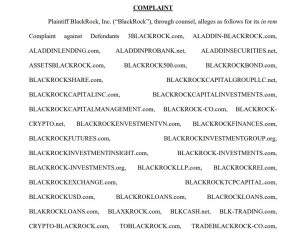
BlackRock’s Legal Battle Against Copycat Sites
BlackRock has called for a crackdown on a variety of potentially fraudulent domains and “typosquatting” websites, which it alleges are exploiting its name.
BlackRock filed a lawsuit on October 10 in the United States District Court for the Eastern District of Virginia against the proprietors of 44 internet domain names containing keywords such as “BlackRock,” “Aladdin,” “capital,” and “investments.”
The asset manager asserts that the domains were registered in bad faith to profit from consumer confusion and divert traffic using pay-per-click advertisements, malware, and email fraud attacks.
Over 95% of the 500 most prominent websites on the Internet are subject to “typosquatting,” according to studies cited by Wiley Rein LLP’s legal team.
This is the practice of registering a domain that corresponds to a typographical error on a legitimate website.

Screenshot of some of the offending domain names. Source: courtlistener
BlackRock asserts that the defendants violated the Anti-Cybersquatting Consumer Protection Act by registering confusingly similar domains to its own.
Several crypto-related domain names, such as blackrock-crypto.net, refused to open, while crypto-blackrock.com offered web design services.
BlackRock searched the Whois database for publicly accessible domain registration information in an attempt to identify the proprietors.
It seeks transfer of the infringing domains to its control, damages, and injunctions against further cybersquatting and infringement of its BLACKROCK, ALADDIN, and BLK trademarks by the defendants.
Copycat domain names are frequently used in tandem with advertising providers like Google and Facebook to promote schemes or distribute malware.
It was reported earlier this year that victims have lost more than $4 million to fraudulent websites promoted with Google Ads.





